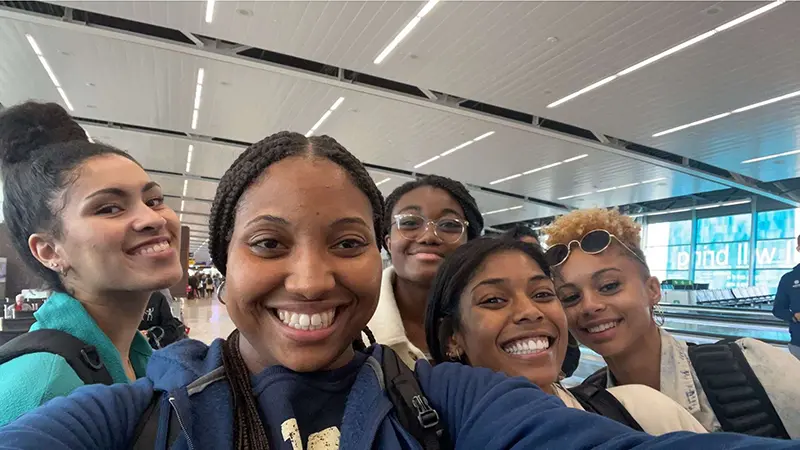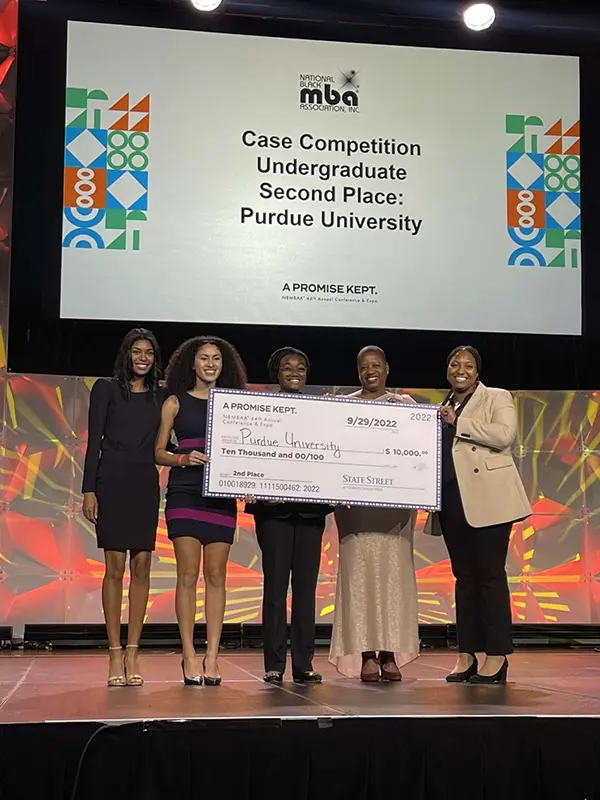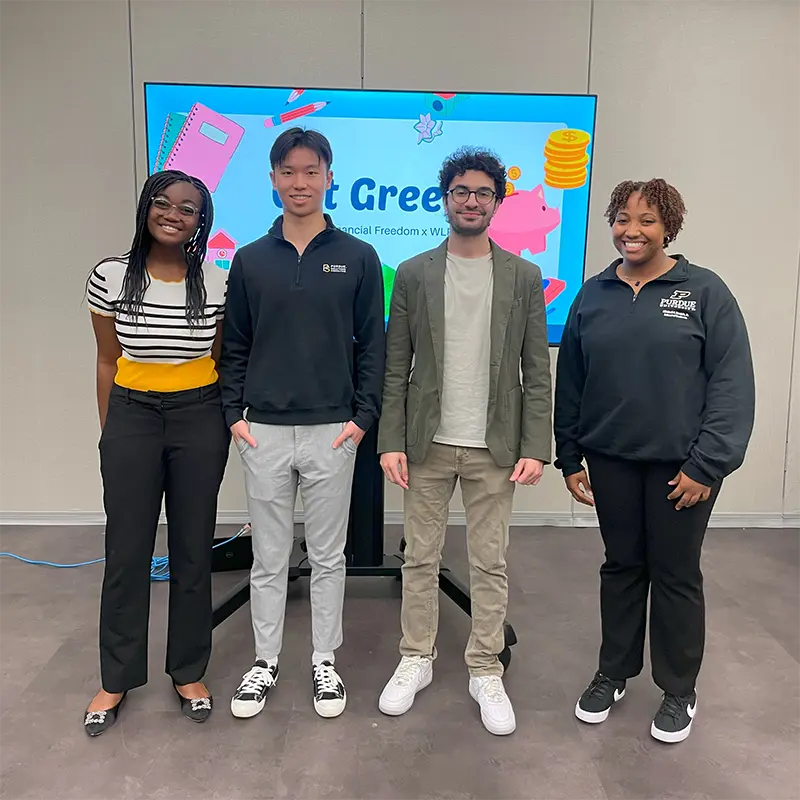
Finance major Rachel Labi has spoken to the Indiana Legislature, worked with three different anti-trafficking organizations, started a personal finance organization, and educated hundreds of people around the world. Because of her financial education work, she was named one of Her Campus' 22 Under 22, has won a Youth Service Young Hero Award, and earned significant scholarships and fellowships. And, she’s just getting started.

What ignited Rachel Labi to better her world began in middle school, when she read that young boys were exploited as laborers by a well-known sporting company to create soccer balls. They worked in poor factory conditions, and the story so moved Labi that she researched it for her English class project. The deeper she dove into the research, she learned of migrant passport theft – when employers in developed nations took migrants’ passports to trap them in the job. Women and girls were forced to have abortions. Some factories collapsed. Some agricultural workers faced exploitation. She learned that the fashion industry was one of the worst.
“I did a lot of research, then I looked into socially focused fashion metrics. I started boycotting unethical brands and wrote letters to several fashion brands to ask about their labor standards and anti-trafficking efforts in the chain. I asked for clarification on sustainable measures and auditing processes. I wrote Vogue magazine about the inclusion of ethical fashion,” says Labi.
After most organizations did not respond to her letters, Labi turned to advocacy, appealing to state and federal leaders about company transparency regulations. What stood out during all her efforts is that only one company – vegan clothing brand PLANT FACED – responded. PLANT FACED reiterated its commitment to ethical fashion.
“I realized I didn't want my personal advocacy to rely only on legislation because people fought that battle for years.”
In high school, Labi’s hero – Malala Yousafzai, the Nobel Prize-winning advocate who survived a bullet to her brain at the age of 15 - inspired Labi to participate in a Hoosier youth policymaking program to accelerate the anti-trafficking movement. She researched American labor laws and learned how agricultural and domestic workers were excluded from fair labor laws in the U.S. Soon, she was speaking in front of hundreds of non-policymakers in support of the Domestic Workers' Bill of Rights Act and the Fairness for Farm Workers Act in addition to her anti-trafficking advocacy. She was invited to join the anti- labor trafficking taskforce for the Indiana Protection of Abused and Trafficked Humans Taskforce (IPATH).
“I've attended a lot of training, learned about survivor empowerment, prosecution, prevention and detection of trafficking,” says Labi. “I started reaching out to a lot of anti-trafficking advocates on LinkedIn, where I met the founder of Mission Jade.”
Mission Jade fights labor trafficking of boys in Guatemala. Labi served as a research volunteer for Mission Jade and continued to leverage her networking skills into connections to Rain Collective – a Middle East and North Africa anti-trafficking nonprofit – and AnnieCannons. During this time, she penned her first anti-trafficking articles and began to move out of personal activism into service, teaching personal development to young women rescued through these organizations.
“I realized I didn't want my personal advocacy to rely only on legislation because people fought that battle for years,” says Labi.

Good with numbers and interested in finance, Labi was primed to expand her efforts beyond anti-trafficking to financial literacy. Again, she took her message to Indiana policy makers.
“Less than 10 states require standalone financial literacy classes,” says Labi. “From research, we know that schools with higher populations of free and reduced lunch students are less likely to offer a personal finance course. Girls are less likely than boys to report that they have financial education conversations with parents.”
With the policymaking fellowship, Labi worked “to create proposals relating to our group’s topic and so we ultimately found that increasing financial education paves the way for economic mobility for all youth. We advocated for a mandatory personal finance class before 400-plus Indiana policy makers. After that, I was able to speak on some different panels like the Closing the GAP Series Financial Literacy Initiative and New America's INSide Out: Youth-Led Policy in the Heartland Panel.”
Even before she came to Purdue to major in finance, with her eye on the prize of running an anti-trafficking nonprofit, she took her next step teaching financial literacy to others. At 17, she co-founded her first nonprofit, Building Financial Freedom (BFF), in 2021. Labi and her small team of ambitious peers research, write and deliver seminars on investing, money mentality, entrepreneurship and financial management.
Having written pieces for Policy Circle, the Indianapolis Recorder and the Institute for Youth in Policy, Labi also appeared on podcasts for the Next Gen Personal Finance Speaker Series and the National Youth Leadership Council. She brought her expertise to audiences of all ages, nationalities and socio-economic backgrounds. In 2023, she was the keynote speaker for a symposium for Global Money Week, where she educated over 40 Nigerian youth. Labi and BFF have partnered with Lafayette Urban Ministry to help at-risk and unhoused families gain better financial know-how.

At her organization’s second event, an investment panel, half of the panelists dropped out on the day of. Labi stayed the course. “I was able to redistribute the content, still hold the event, and we were able to add a lot of great supporters and BFF partners,” Labi says.
Labi doesn’t give up easily. She plans to support financial education policy in the U.S., to write more in support of it and share the diverse stories of financial education success. She’s especially driven to support underserved groups, including collegiate and professional athletes whose financial educations have been so lacking that they give into lifestyle pressures and the spending desires of family members, making poor investments until they go broke.
On BFF’s website Labi reports how many attendees she reaches at each event. She’s reached hundreds, but she’s driven to reach thousands within the next few years. She also wants her current and future partners to see that her organization focuses on diverse groups.
Labi describes herself as “a naturally service oriented person” whose core value is integrity, which she thinks is especially critical as a business major. “I already know that I won't put money before people, and I've also avoided positions with companies because their actions are not in line with my values,” she says.
Part of Labi’s success is being intentional with every choice. As a local student, Labi first thought she’d attend another university – it was “just the hometown school” for this West Lafayette High School graduate – but she picked Purdue because it was the financially wisest choice. She landed enough scholarships and grants to attend full ride. The university then exceeded her expectations.
“I'm in one of the top university entrepreneurial ecosystems in the world, and I've networked with innovative founders and operations, retail, food, consulting, et cetera,” says Labi. At Purdue, she found “faculty who will help you, staff, students, alumni and good friends ”
As iron sharpens iron, Labi’s diverse connections, especially within the Business Opportunities Program (BOP), have spurred her to grow and improve. “The culture of excellence has pushed me to have an internship every summer and engage in corporate programs with companies like Bridgewater Associates and LLR Partners,” says Labi. She and three fellow BOP members placed 2nd in the 2022 National Black MBA Undergraduate Case Competition.
“I've gotten rejected so many times, so really I think by viewing the failure as an opportunity to improve, that's far better and far more fruitful than viewing it as an obstacle.”
“Without peers motivating me to be the best, I may not have aimed for Google, where I'll be interning this summer,” she says. Many of her BOP peers are not only friends but also entrepreneurs. BOP has provided her with a community that she enjoys being around, and Director Darren Henry has encouraged her to take advantage of internship prospects, professional engagement opportunities, and scholarships.
Labi sets a high bar for herself. She plans to grow BFF, adding more speaking opportunities and connections this year. She’ll be working with her family’s Seeds of Hope nonprofit to support people in Ghana. Currently, she’s pursuing a Fulbright Fellowship in Latin America to improve her Spanish and expand her advocacy. Then she’d like to earn a dual MBA and MPP, hopefully, from the University of Chicago so she can pursue business with social impact. “I also want to start a venture capital firm that invests in social enterprises focused on the UN's Sustainable Development Goals in the future.”
For any fellow student wanting to make a difference she says, “Think about the impact you want to make first and then make relevant partnerships and relationships.” Also, don’t give up.
“I've gotten rejected so many times, so really I think by viewing the failure as an opportunity to improve, that's far better and far more fruitful than viewing it as an obstacle.”